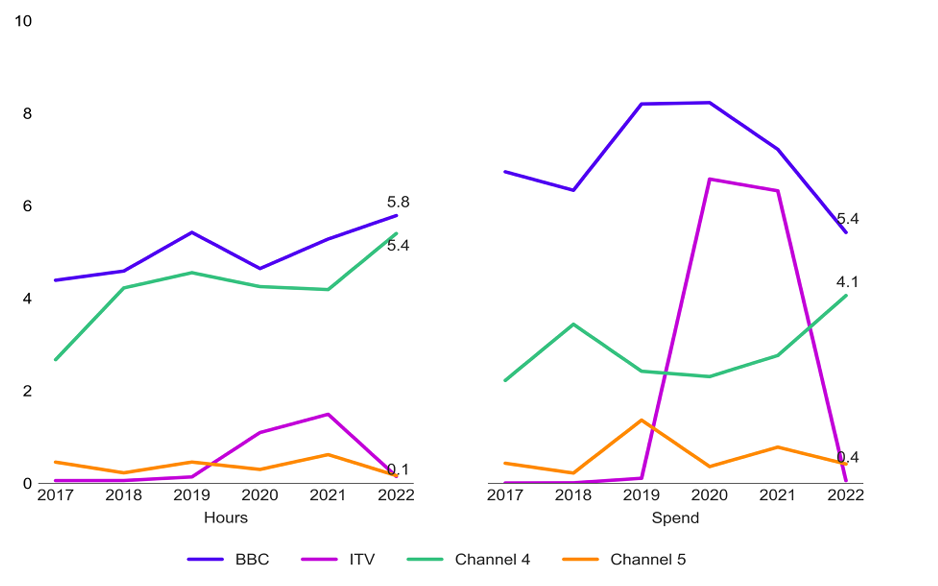On 17 July the Senedd will debate the Culture, Welsh Language, Communications, Sport and International Relations Committee’s report, State of Play: Public Service Broadcasting in Wales.
Another report has said the supply of media content for Wales is inadequate. But budget restrictions for public service broadcasters and a lack of new policy direction from the UK Government – which is responsible for broadcasting – make it hard to see where improvements will come from.
“The supply of media content for Wales is inadequate”
In 2021, the previous Senedd’s Culture Committee concluded that "the supply of media content for Wales is inadequate". This was reiterated by the current committee in its March 2024 report, State of play: public service broadcasting in Wales.
The Welsh Government shares these concerns. “The current situation in Wales is unsustainable“, according to previous Deputy Minister for Arts, Sport and Tourism, Dawn Bowden MS, and “action is needed to protect public broadcasting and to improve the overall media environment in Wales”.
The Deputy Minister’s comments followed an expert panel report produced for the Welsh Government in 2023 which said “the Welsh Government should establish a Shadow Broadcasting and Communications Authority”. The Welsh Government decided not to do this, instead announcing plans for an advisory group.
The Independent Commission on the Constitutional Future of Wales said in 2024 that “the Welsh perspective on UK affairs is often absent in media content” and called for constitutional reforms to provide a “stronger voice for Wales on broadcasting policy”. A 2023 report from the Institute of Welsh Affairs made the case for devolving some broadcasting powers to Wales, following similar conclusions from the previous Senedd’s Culture Committee.
The diagnosis in these reports seems clear: audiences in Wales aren’t getting the media services they deserve. But where will improvements come from?
BBC: double the local TV spend in Scotland compared to Wales
The licence-fee funded BBC represents the biggest public intervention in the UK broadcasting market.
The BBC’s estimated income from the licence fee raised in Wales in 2022-23 was £187 million, compared to expenditure by the BBC in Wales in the same year of £208 million (11% more).
£72 million of this was network TV spend. According to its operating licence with communications regulator Ofcom, at least 5% of the BBC’s expenditure on UK network programmes must be spent in Wales (in 2022 the actual figure was 5.4%).
Over the last eight years, spend on English language TV content for audiences in Wales (or “local content”) has increased from £20.4 million (in 2014-15) to £36 million (in 2022-23). Despite a substantial 76% increase, this figure is dwarfed by the spend on local content in Scotland. There, the need to fill a schedule for separate channel BBC Scotland, as well as providing content for BBC One in Scotland, means the total local content figure is £72 million: double what is spent in Wales.
When questioned by the Culture Committee on this discrepancy, BBC Cymru Wales boss Rhuanedd Richards said: “if I've got a target [for English language television], it's year-on-year growth”. The Committee welcomed this aim, calling for parity between local spend in Wales and Scotland.
The BBC’s response to the Committee’s report made no reference to increasing funding for local content in Wales. The broadcaster has faced reduced public income of 30% in real terms for its UK services over the last decade, raising questions about how additional spending could be funded.
ITV: network spend in Wales has plummeted
ITV owns the Channel 3 licence in Wales. This means it provides public service content (four hours of news and 90 minutes of non-news programming for Wales every week) according to the terms of a licence set by Ofcom.
In 2022, ITV (which owns all of the UK’s Channel 3 licences other than those in Scotland) spent close to 0% of its qualifying network spend in Wales, following the return of I’m a celebrity…get me out of here! to Australia.
Proportion of qualifying network spend in Wales, by PSB: 2017-2022 (%)

Source: Ofcom, Media Nations Wales 2023
The Culture Committee called for the next Channel 3 licence, which expires at the end of 2024, to require a greater proportion of network content in Wales. Ofcom responded that it does not have the power to specify where production should take place, above a requirement that “at least 35% of originated network content is made outside of the M25 area.”
S4C: no “adequate, reliable, predictable funding source”
Along with the BBC, S4C is also funded from the licence fee. Although it received an increase in its most recent funding settlement, since 2010, the UK Government has reduced S4C’s funding in real-terms by over 30%.
S4C explained to the Committee that they’ve cut their cloth by prioritising children’s programming, drama and sport. But according to former Chair Rhodri Williams, “we do have to have an adequate, reliable, predictable funding source”.
The Committee agreed, calling for the UK Government to “significantly increase” S4C’s funding, and to consider using a funding formula to give the broadcaster more certainty over future funding.
UK Government: new Media Act welcome, but not transformative
Ultimately, responsibility for driving improvements lies with the UK Government, which designs the broadcasting architecture in the UK, and sets the licence fee to fund the BBC and S4C. Ofcom operates according to direction from Westminster.
The Committee called for the UK Government to “set out how it will improve the provision of media content for audiences in Wales”. The UK Government responded by pointing to various aspects of the Media Act 2024.
This Act updates the regulation of public service broadcasting. Previously, this operated under a system inherited from the analogue age, before the industry was transformed by the multi-channel, digital revolution. The Committee welcomed the Act, whilst pointing out that it was “unlikely to drive significant improvements to current levels of provision for audiences in Wales”.
Welsh Government: reduced funding for broadcasting
For many years the Welsh Government did not support the devolution of broadcasting, which is reserved to Westminster. But this changed in 2021 following the Cooperation Agreement with Plaid Cymru, which ended in May 2024. Current Welsh Government policy, in its Programme for Government, is to “pursue the case for devolution of broadcasting and communication powers”.
When the Culture Committee discussed this commitment with new Cabinet Secretary for Culture and Social Justice in July 2024, she struck a more circumspect tone. Asked if she would be pursuing the devolution of broadcasting, she said she hadn’t “formed an opinion as yet” and would discuss it with Cabinet colleagues and the new UK Government.
A budget of £1 million for broadcasting in 2024-25, as set out in the Co-operation Agreement budget, has been whittled away. A Welsh Government official told the Committee that only £250,000 of this would now go to broadcasting – to fund a newly-announced advisory group – with the rest going to support creative industries skills development and journalism.
The previous Deputy Minister said that “action is needed to protect public broadcasting and to improve the overall media environment in Wales”. Will this action be enough for audiences to see improvements on their screens?
Article by Robin Wilkinson, Senedd Research, Welsh Parliament






